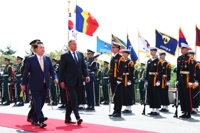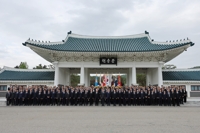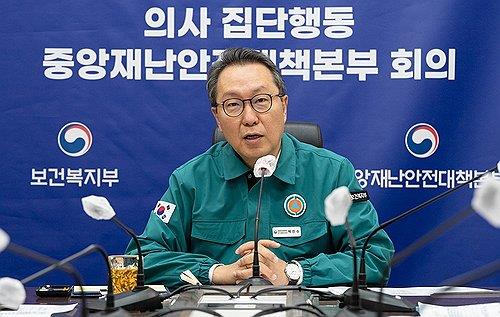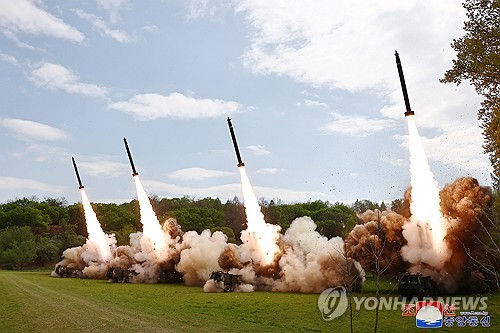U.S. renews calls on S. Korea to join economic security campaign against China
By Kim Seung-yeon
SEOUL, Oct. 14 (Yonhap) -- The United States raised its "Clean Network" campaign against China during senior economic talks with South Korea on Wednesday, officials said, as Washington pushes to ban Chinese technology from global digital and wireless networks, citing security risks.
The initiative was among the agenda items discussed in the fifth Senior Economic Dialogue (SED) led by Second Vice Foreign Minister Lee Tae-ho and U.S. Under Secretary of State Keith Krach, a foreign ministry official said.
"The U.S. side explained its position on the matter, and we explained our basic position to them," the official told reporters after the meeting.
"It was not a discussion in the sense that one side asked the other specifically what or whom to exclude, but we talked about the importance of the Clean Network and the issues requested by the U.S.," he said.
Washington has been stepping up its push to form a united front with like-minded countries against using Chinese equipment, like fifth-generation (5G) networks by Huawei Technologies Co. and mobile applications like WeChat, on the grounds of what it cites as national security risks.
U.S. Secretary of State Mike Pompeo unveiled the Clean Network program in August and called for "all freedom-loving" countries to join the initiative.
The U.S. State Department has labeled South Korean mobile carriers SK Telecom Co. and KT Corp. as "clean" telecommunication firms that do not use Huawei, while calling for LG Uplus Co., a smaller South Korean rival that still uses Huawei equipment, to stop using it.
Seoul has maintained that it is up to companies what technology they will use and that the government cannot interfere in the decision-making process of private firms.
"We made it clear that whether a private telecom company uses the equipment of a specific enterprise is up to that company to decide," the official said. "But regarding the general security risks posed by the 5G technology in the telecommunication market, we agreed to work closely with the U.S. side and cooperate in terms of technological issues," the official said.
The Economic Prosperity Network (EPN), an envisioned U.S. initiative aimed at shifting global supply chains away from China, was not part of the Wednesday discussion, he added.
Other issues discussed were strengthening the global distribution system for health-related items since the coronavirus pandemic has exposed the vulnerability of the supply system.
The two sides exchanged views on ways to enhance cooperation in the pandemic situation, science and technology and energy, as well as linking the New Southern Policy and the Indo-Pacific strategy and women's empowerment in economic and new technology fields, the ministry said in a release.
The New Southern Policy aims to deepen Korea's relations with the Association of Southeast Asian Nations and India, while the Indo-Pacific Strategy seeks to enhance America's engagement with partner countries and protect what it calls the rules-based order in the region.
The two sides agreed to hold their fourth annual public-private economic talks later this month in the follow-up to the SED, the ministry said.
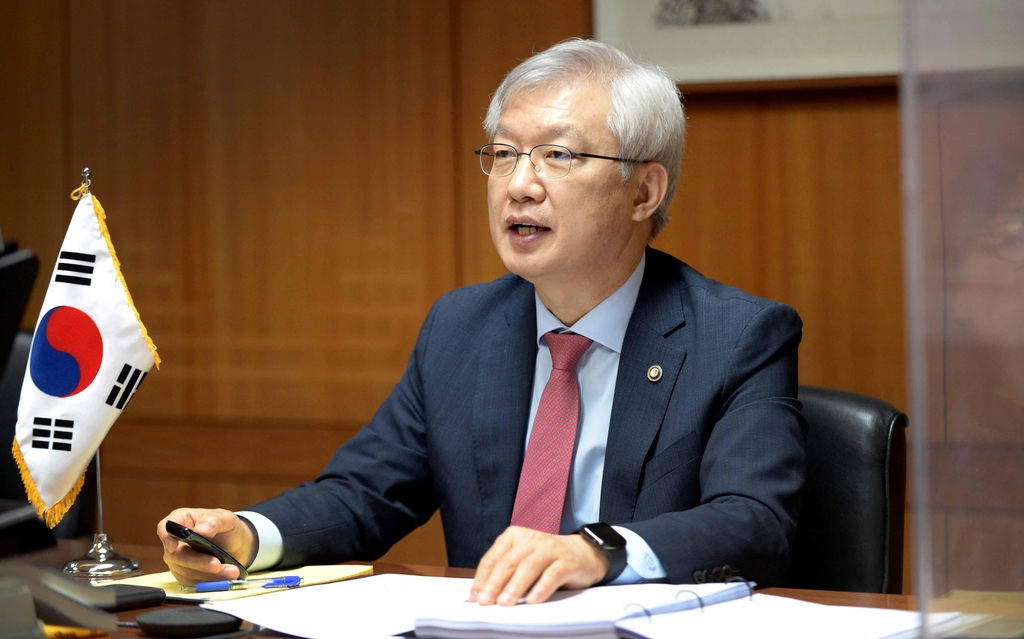
Second Vice Foreign Minister Lee Tae-ho speaks during the annual Senior Economic Dialogue (SED), vice ministerial talks between South Korea and the United States, held virtually on Oct. 14, 2020, in this photo provided by the foreign ministry. (PHOTO NOT FOR SALE) (Yonhap)
elly@yna.co.kr
(END)
-
 Overdue debut of Korean abstract art pioneer Yoo Young-kuk at Venice Biennale
Overdue debut of Korean abstract art pioneer Yoo Young-kuk at Venice Biennale -
 Relax, immerse yourself in scents at Venice Biennale's Korean Pavilion
Relax, immerse yourself in scents at Venice Biennale's Korean Pavilion -
 S. Korea marks 30th anniv. of Korean Pavilion at Venice Biennale with contemporary art
S. Korea marks 30th anniv. of Korean Pavilion at Venice Biennale with contemporary art -
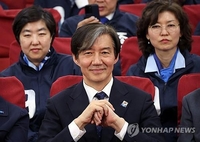 Ex-Justice Minister Cho slams Yoon's statement on crushing election defeat
Ex-Justice Minister Cho slams Yoon's statement on crushing election defeat -
 Artist Lee Bae captures ethereal Korean aesthetics at Venice Biennale
Artist Lee Bae captures ethereal Korean aesthetics at Venice Biennale
-
 Overdue debut of Korean abstract art pioneer Yoo Young-kuk at Venice Biennale
Overdue debut of Korean abstract art pioneer Yoo Young-kuk at Venice Biennale -
 Relax, immerse yourself in scents at Venice Biennale's Korean Pavilion
Relax, immerse yourself in scents at Venice Biennale's Korean Pavilion -
 Artist Lee Bae captures ethereal Korean aesthetics at Venice Biennale
Artist Lee Bae captures ethereal Korean aesthetics at Venice Biennale -
 S. Korea marks 30th anniv. of Korean Pavilion at Venice Biennale with contemporary art
S. Korea marks 30th anniv. of Korean Pavilion at Venice Biennale with contemporary art -
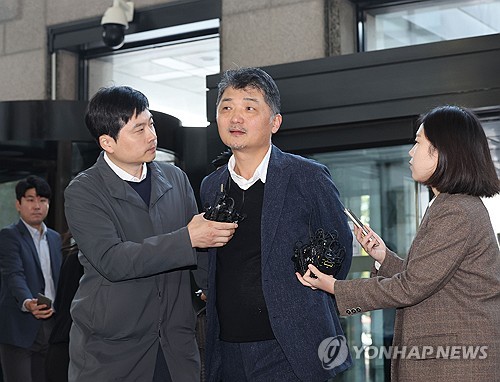 Questioning necessary for Kakao founder for suspected stock rigging: prosecution
Questioning necessary for Kakao founder for suspected stock rigging: prosecution
-
 (LEAD) N. Korea fires several short-range ballistic missiles toward East Sea: JCS
(LEAD) N. Korea fires several short-range ballistic missiles toward East Sea: JCS -
 (LEAD) N. Korea says Kim guided simulated nuclear counterattack drill
(LEAD) N. Korea says Kim guided simulated nuclear counterattack drill -
 Hybe launches audit into NewJeans' label ADOR over alleged independence move
Hybe launches audit into NewJeans' label ADOR over alleged independence move -
 N. Korea says Kim guided simulated nuclear counterattack drills for 1st time
N. Korea says Kim guided simulated nuclear counterattack drills for 1st time -
 N. Korea fires unspecified ballistic missile towards East Sea: S. Korean military
N. Korea fires unspecified ballistic missile towards East Sea: S. Korean military
















